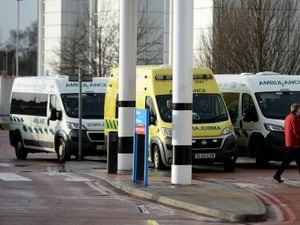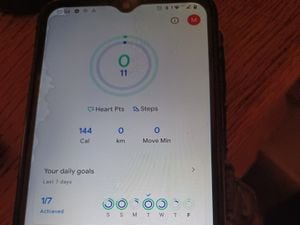Continuing ambulance handover delays creating fatal knock-on effects
The continuing problem of ambulances being stuck outside Black Country hospitals waiting to handover patients is proving fatal.

West Midlands Ambulance Service revealed "handover delays" cost £4.29 million a month with every hour costing £150.
The consequences of ambulances being stuck outside hospital, known as stacking, are dire with some patients waiting as long as 19 hours outside and paramedics being able to get to emergencies.
WMAS director of nursing and clinical commissioning Mark Docherty said: "When there is stacking no ambulances are immediately available to respond.
"This means patients with critical medical emergencies do not get the response they need and may suffer significant harm or death.
"The issue of patient handover delays shows little sign of improvement and the impact of this means we are keeping patients waiting for very long periods for an ambulance response."
He added: "As a consequence, there is an increase in the numbers of serious incidents being reported and investigated."
"The lost hours for the year to date has plateaued across August and September, but early indicators for October suggest a worsening position.
In the Black Country Dudley's Russells Hall Hospital and Wolverhampton's New Cross Hospital had the worst handover times.
In September 238 patients Russells Hall Hospital were forced to wait outside up to hours, 185 between two and three hours, 102 between three and four hours and two patients were forced to wait between 18 and 19 hours.
At New Cross Hospital 207 patients were forced to wait between one and two hours, 96 between two and three hours and 40 between three and four hours.
WMAS executive medical director Dr Alison Walker told board members of the ambulance service Trust the problem could get worse in the months ahead.
She said: "We remain extremely concerned about handover delays as winter approaches and the cold weather, especially if it snows, will create even more delays."
The cost of ambulance handover delays is putting pressure on the finances of West Midlands Ambulance Service.
The WMAS Trust board meeting heard how 57,000 hours have been lost this year due ambulances waiting outside hospitals.
Rising fuel and energy costs have also forced Trust bosses to reassess its expenditure and create a new financial strategy.
Interim director of finance Paul Jarvis reported: "Due to the high level of uncertainty and instability within the operating environment, such as unprecedented inflationary pressures, the time horizon for the strategy is short, running from the November 2022 through to March 2024."
Several board members, including deputy-chair Wendy Farrington-Chadd, stressed patient safety would not be compromised by any cost-cutting.
However, patients safety is being effected by the stresses in the system caused by handover delays as the number of "serious incidents" has risen this year.
From March 2021 to April 2022 WMAS logged 63 incidents, however, between April and October this year there have been 218 cases with 32 in September alone.
Mr Docherty said: "Patient handover delays continue to result in significant patient harm and the impact of these delays resulting in long patient waiting times also causes harm, including death.
"As a result of long delays, the number of serious incidents involving serious harm or death remains significant."
He added: "Due to the number of serious incidents increasing in part due to delays resulting from lost hours of handovers, there has been a significant pressure on the team that lead the investigations and people responsible for implementing the agreed actions."
However, a new pilot scheme being trialled in Birmingham could help combat the problem of ambulance handover delays.
At Queen Elizabeth and Heartlands Hospitals new Ambulance Decision Areas have been created which have specially trained ambulance workers looking after patients and making decisions about their care before they are admitted.
More than 50 new recruits have been taken on in a mix of band seven paramedic roles, and ambulance health care assistants.
The first few weeks of the trial have been successful and more healthcare Trusts across the West Midlands are signing up to follow suit.
WMAS Non-emergency services operations delivery and improvement director Michelle Brotherton told Trust board members the new system was working.
She said: "The Ambulance Decision Area at University Hospitals Birmingham has been a real success. Staff are working together well on hospital grounds and in some cases are taking patients straight to wards they need to be in.
"A lot of hard work has gone into this with training and sorting out governance issues and we want to see other hospitals in the West Midlands sign up to this in the next 12 months."





